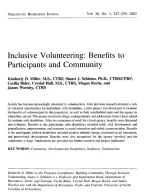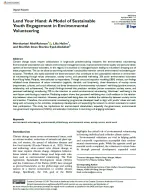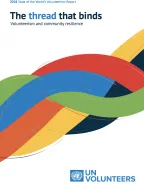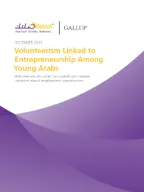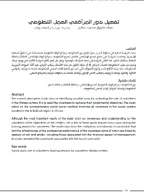
Technical paper
The role of volunteers in leaving no one behind: Supporting United Nations entities and national governments towards realizing the 2030 Agenda for Sustainable Development
Volunteerism and the SDGs
Download
Fast read
This research paper by the United Nations Volunteers (UNV) programme provides evidence of how volunteers support efforts to leave no one behind (LNOB). It highlights best practices in how national governments and United Nations entities include volunteers in their LNOB strategies and outlines policy recommendations on how to further embrace the integration of volunteer mechanisms in support of LNOB.
Synthesis
- The paper draws primarily on evidence from the Global South, with a focus on national and community-based volunteers. The analysis is informed by a review of secondary literature, data related to volunteering that has been published in national government and United Nations reporting documents from 2021 to 2023, and two primary case studies from Bangladesh and Kosovo.
- The evidence presented relates to several key areas of focus for volunteers globally, which line up with recommended pathways to LNOB. These include: identifying and monitoring who is left behind; assisting with the delivery of health, education and social protection services; structuring approaches to disaster risk management; fostering gender empowerment; and advancing measures in support of inclusive governance and peacebuilding.
- In addition to examining the evidence on LNOB outcomes for beneficiaries of volunteering, the paper includes a brief overview of considerations regarding volunteers themselves and how to ensure that no volunteer is left behind.
- Findings highlight that national governments and United Nations entities play an essential role in creating the conditions for volunteers to thrive. Ensuring that volunteering consistently promotes the LNOB agenda requires coordinated efforts across formal and informal volunteering networks and systems to provide enabling legal frameworks, inclusive operational systems and well-resourced implementation practices.
- The paper recommends three intervention areas for United Nations entities and national governments. These span the volunteer ecosystem and can ensure that voluntary actions are directed towards amplifying the voices and influence of those who are most marginalized: (1) An LNOB-compatible regulatory environment: This type of regulatory environment considers volunteer policies and the breadth of public policy in a holistic manner, seeking to facilitate environments that support and protect volunteers and linking their efforts to sustainable impacts for the poor and marginalized; (2) Inclusive operational structures: These are needed to facilitate flexible coordination mechanisms and to address digital disparities; (3) Well-resourced implementation practices: Volunteering initiatives that are supported by capacity-building and investment in infrastructure serve the interests of volunteers and programme beneficiaries.













